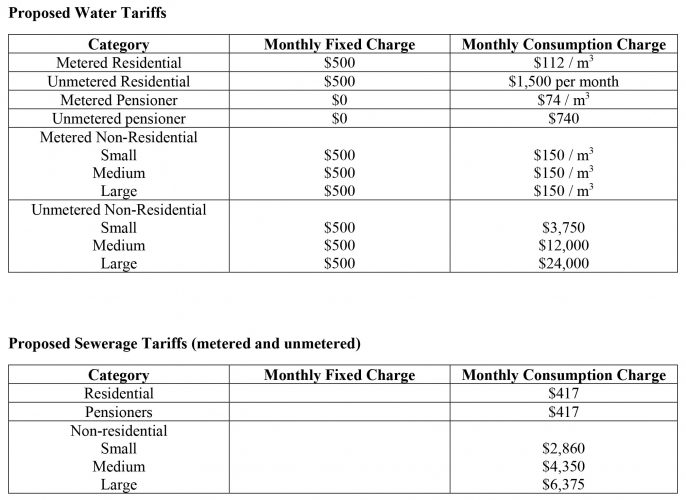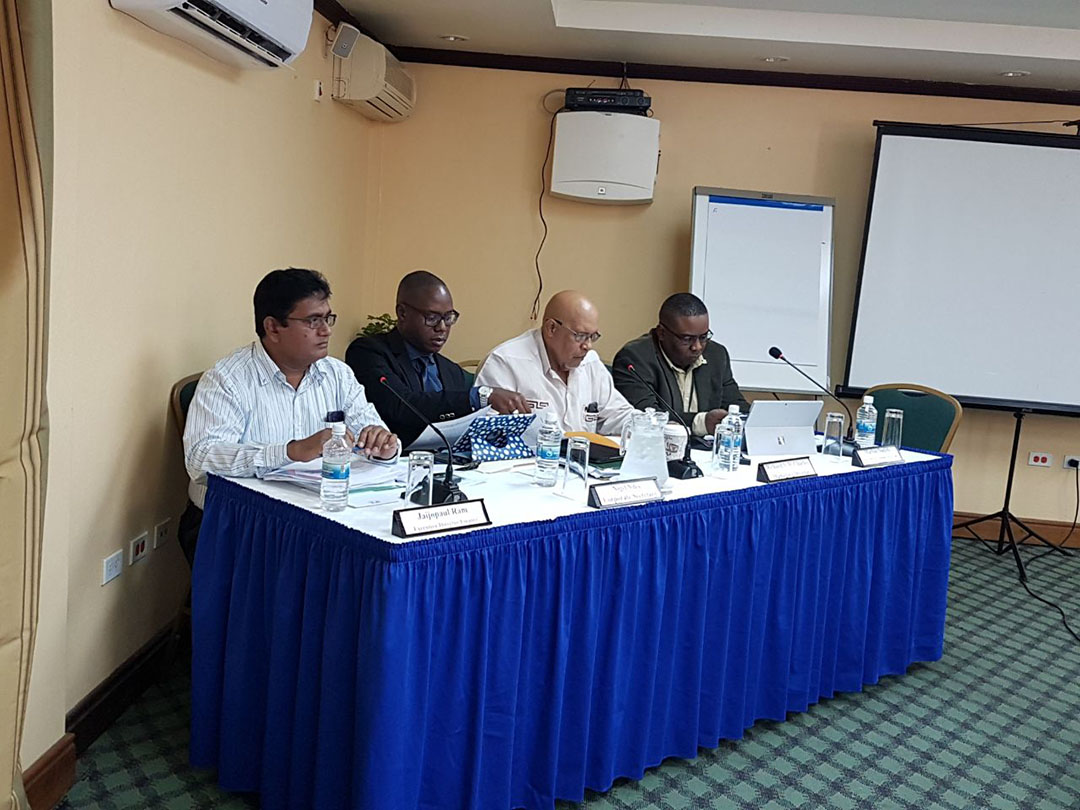Despite GWI’s Managing Director, Richard Van West-Charles arguing strongly for tariff increases, the Public Utilities Commission (PUC) yesterday insisted that the accounts of the utility be presented for examination.
Audited records for the Guyana Water Inc (GWI) are not available for the last two years and this has resulted in a request for the unaudited versions. The PUC request for the accounts came at the end of yesterday’s hearing on the application by GWI for increased tariffs. It was the second hearing to be held.
PUC Chairwoman, Della Britton, following a discussion among the members of the Commission, advised Van West-Charles, to take the proposal to make available the unaudited financials for 2016 and 2017, back to GWI’s Board of Directors.
The 2015 audited statements have already been provided.
Van West-Charles indicated that the Board will be meeting today, and as such, he will relay the request to them, and communicate that information to the PUC at the conclusion of the meeting.
Although the Chairman argued strongly yesterday for the need for an increase in rates, audience members were not swayed in their stance that the hearings should not proceed without the financial records being produced.
Criticism came from accountant, John Seeram. He told the hearing that he was instrumental in setting up GWI’s financial system in 2002 and shared the view of another accountant at the hearing, Ramon Gaskin that the commission could not move on with their work until the financial records were produced. He advised that focus should be placed on the company’s key performance indicators, so a comparison could be made by year.
Seeram opined that GWI’s employment costs have always been unusually high, and recommended a job evaluation be done. He noted that the labour costs versus the cost of income should also be examined.
Gaskin was once again vocal on the issue, asserting that GWI’s application should not be entertained until they comply with the PUC’s Act, which he related requires that the provision of financial information be a prerequisite for an application being considered.
Furthermore, Gaskin, commenting on the sections of the 2015 audited statements that he had been privy to, opined that the “numbers are horrible” as GWI was “spending a lot of money and collecting less” and commented that the company is out of control in its spending, making specific reference to the payroll and travel expenses.
“How can you run a company where people owe you $4.8 million and come here asking for more?” Gaskin questioned.
Forensic audit
“…What about the financial health of this company?” he pressed, suggesting that GWI needs to be subjected to a forensic audit.
“Looking at numbers itself is not the story, but the explanation of the numbers,” the Director responded.
 Van West-Charles, in defending the employment costs, related that GWI has invested a lot in building the competency of its technical staff, sending them overseas for training opportunities.
Van West-Charles, in defending the employment costs, related that GWI has invested a lot in building the competency of its technical staff, sending them overseas for training opportunities.
“In 2015 everything was contracted out,” he explained, stating that they have begun to rebuild their capacity so that they can in turn, reduce the operating costs.
“…if we want to have 24-hour service, treatment plants have got to operate on 3 shifts. It cannot operate on two shifts, so you have to have staff. You gotta have staff monitoring the quality,” he related, noting that any “slippage” can compromise the quality of the water.
“…In terms of the job categories, when I joined this company, some of the sewage workers got a payment of $5 per shift. Sewage workers. That’s a shame. It’s a crime to pay sewage workers [that] in 2015. Moreso…those sewage workers, in accordance with standards, should not be joining the buses and going to their homes. We are now moving to put the baths, the required baths and standards so that they can shower properly, have their clothing washed properly in accordance to the standards set out.”
“So we want to have a first class approach…but at the same time we have to ensure that occupational health and safety for the workers is an operational principle. We have to buy protective gear. When they go down in the sewers we are sleeping…if we don’t provide these things, we don’t know whether they’ll come back up. And that has a cost,” he said, adding that “the devil is in the numbers and the explanations”.
Van West-Charles had also explained to the Commission that if GWI is to reach the standards set by the World Health Organisation, investments need to be made, not only to upgrade the outdated infrastructure network, but also to create networks where they do not yet exist. He also noted that the cost of purifying water has increased by more than 100% in the past 12 years, when the last rate change was implemented.
In response to an attendee who stood before the Commission displaying a bottle containing mud-brown water he said had come from his taps, and who questioned why GWI should be granted a tariff increase when they cannot deliver on good quality water, Van West-Charles related that the company has been working to reduce the high iron content in water, naming places such as Edinburgh, Ithaca, Goed Fortuin, and Agricola, where this has already been accomplished.
He noted that as new housing schemes have emerged, the company has had to make provisions for new infrastructure.
Another justification for the rate change presented is that salaries for the company’s staff are uniform across regions, as are the costs for water treatment and power generation. Therefore, by “harmonizing the bands”, GWI will bring equity to the system.
On collecting debts as a way to finance investments, the Director said: “When we apply the Limitation Act and look at the debt beyond the last three years, there is no way; if you collect that debt anyway, that you can cover the cost …because nothing stands still. We’re having customers every day, we’re having new hosing schemes; both private and public, we are looking at already existing schemes that do not have access, those that require an improvement of quality such as New Hope”,
Consumer rights advocate, Pat Dial, suggested that the company reconsider its ancillary charges, from the perspective of whether consumers will be willing and able to pay and if they will be able to bypass GWI’s system. He was making specific reference to the reconnection fee at the time.
According to the Managing Director, if the increase is granted, the company foresees an annual revenue collection of $6.1 billion, a $2.2 billion incremental increase.
The next hearing on the matter is scheduled for March 14 at Cara Lodge. It is scheduled to begin at 10 am.






